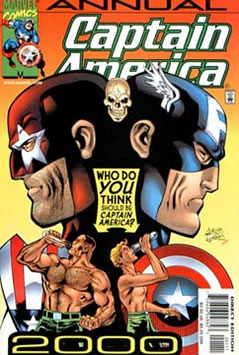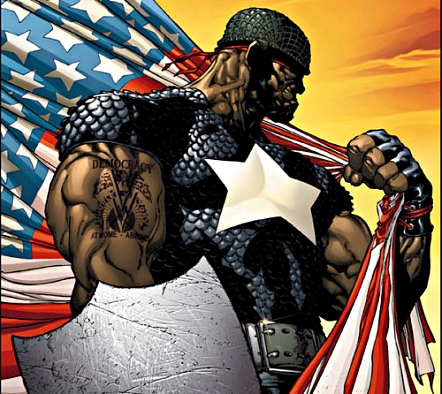Before we move on to beginning of Steve Rogers’ career as Captain America, let’s take a brief aside to consider the consequences of Prof. Erskine’s demise. The presumption that the serum, if it could be recreated, would work on anyone has led to a number of attempts to recover Erskine’s lost process (including one that was used to explain the “Commie-smashing Captain America” of the mid-1950s; more on that to come). A 2000 story arc revealed the story of an effort to test the serum even before Rogers was chosen for the procedure. An impatient U.S. military officer grew tired of Erskine’s determination to perfect the serum and process before using it on a human subject. He stole a sample and administered it to a disgruntled soldier, Clint McIntyre, in exchange for arranging his release from military prison.[1]
 Cover by Dan Jurgens, Art Thibert, Chris Sotomayor
Cover by Dan Jurgens, Art Thibert, Chris Sotomayor
More famously, in the Truth: Red, White, and Black series, one black soldier involved in a secret government program, Isaiah Bradley, survived the process and served one mission as a fabled “Black Captain America.” In Roy Thomas’s Invaders series, a popular Golden-Age hero called the Destroyer was revived and said to have received a “derivative of the super-soldier serum” recreated by one of Erskine’s original assistants when the men were together in a Nazi prison camp. Later in his modern career, Cap found himself at times facing “enhanced” enemies who owed their superior abilities to procedures that attempted to duplicate Erskine’s formula.[2]
Each of these attempts to recreate the original super-soldier serum managed to replicate the physical enhancements of the original, but in every case, the recipient developed mental and eventual physical dysfunctions, leading to erratic, unpredictable behavior. Isaiah Bradley was court-martialed by the Army for acting on his on initiative (and stealing a costume meant for Steve Rogers) and sent to prison, where he languished for 17 years while reverting to the mental capacity of a child. A couple of different storylines have men identified as the Destroyer either becoming a revenge-obsessed Nazi hunter who thinks himself above moral judgment or an outright, murderous sociopath. Clint McIntyre (as well as later “enhanced” soldiers such as “Nuke”) became an uncontrollable berserker whose body simply gave out under the extreme physical stress. In these instances, at least, it seems the idea finally given voice in the recent Captain America film—that the super-soldier serum somehow amplifies its recipient’s inner nature—is valid.[3]
The film version emphasizes the importance of Steve Rogers’ moral sensibilities and strength of character in creating the only successful super-soldier. Dr. Erskine knows that the super-soldier serum, in some mysterious way, enhances the natural traits of the recipient. Erskine carefully measures Rogers’ motivations, then probes more deeply into the nature of the man himself. Pop culture critic Anthony R Mills notes,
Erskine also has moral and philosophical reasons for preferring Steve. He is not looking for a killer or even an expert soldier . . . . Instead, Erskine is drawn to Steve because he is selfless, determined, honest, courageous, and considerate of the weak. When Steve asks before the procedure why Erskine chose him, he responds, ‘Because the strong man who has known power all his life may lose respect for that power, but a weak man knows the value of strength and knows compassion. Whatever happens tomorrow you must promise me one thing: that you will stay who you are, not a perfect soldier, but a good man.’[4]
Only Isaiah Bradley was a match for Steve Rogers’ character, and even in his case the rushed and incomplete process, along with his own rage and bitterness at having been the victim of racism and manipulation, resulted in physical and mental disability.[5]
The Captain America Comics 70th Anniversary Special features a story that sums all this up. Cap’s WW II teen sidekick, Bucky Barnes, recalls a story Steve has told him about the days leading up to his volunteering for the procedure. In this story, frail, despondent Steve Rogers finds himself thrust into an unexpected crises in which he’s shown to inherently possess many of the character qualities—and even nascent skills—that later define Captain America. “The thing that makes Captain America great,” Bucky reflects, “is Steve Rogers.”[6]
[1] The Clint McIntyre story appears in CA vol. 3, 33-39 (2000) and the CA 2000 Annual. He was later revived and manipulated into thinking Rogers had taken his rightful place as America’s super-soldier and set out to kill him (more on that story later).
[2] Isaiah Bradley appeared as “the Black Captain America” in Truth: Red, White & Black 4-5 (2003). The Destroyer character originally appeared in a number of Timely’s Golden Age publications, but the story of his having received a variant of the super-soldier serum was retconned in Marvel’s Invaders (1975-79), Citizen V and the V-Batallion (2001-02), Destroyer (2009), and The Marvels Project series. Cap had encounters with two of these “enhanced” government agents—“Nuke” in Daredevil #233 and “G.I. Max” in CA #331. John Walker, who would take over as Captain America when Rogers resigned in the 1970s and Cap’s long-time friend and some-times partner Dennis Dunphy (D-Man) were also products of human enhancement programs.
[3] Captain America: The First Avenger (2011), directed by Joe Johnston.
[4] Anthony R. Mills, American Theology, Superhero Comics, and the Cinema: The Marvel of Stan Lee and the Revolution of a Genre (Routledge, 2014), p. 183-84 (quoting the CA film).
[5] Revealed in Truth: Red, White, & Black #7 (July 2003), Morales. In this story, “present day” Steve Rogers visits the still-living Bradley, giving him back the stolen WW II costume that led to all of his troubles.
[6] CAC 70th Anniversary Special (2009), written by James Robinson.

